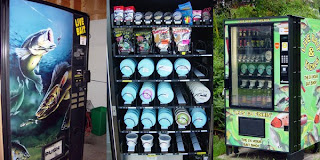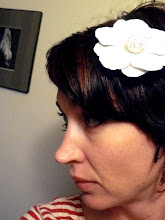Sunday, October 31, 2010
MONDAY
Art 1: Periods 3, 4, 6, 7
Drawing upside down is another way to experience the shift from left-mode to right-mode.
Go to activity on Upside-Down Drawing by clicking here.
Get two sheets of 9" x 12" paper.
Follow the directions for each drawing. Each drawing should take at least 20 minutes. Everything is right there for you to draw. Don't make it complicated, but do focus, please.
"I have supposed a Human Being to be capable of various physical states, and varying degrees of consciousness, as follows:
(a) the ordinary states, with no consciousness of the presence of Fairies; (b) the 'eerie' state, in which, while conscious of actual surroundings, he is also conscious of the presence of Fairies; (c) a form of trance, in which, while unconscious of actual surroundings, and apparently asleep, he (i.e., his immaterial essence) migrates to other scenes, in the actual world, or in Fairyland, and is conscious of the presence of Fairies/" --Lewis Carroll
How does Carroll's quote connect to our Right-Mode workshop?
Art 1,3: Period 8
Did you check out some information on linoleum block printing?
If so, please check out the following artworks (demonstrating protest), and answer these discussion questions in the comments section of this blog post.
1. Picasso's Guernica
Drawing upside down is another way to experience the shift from left-mode to right-mode.
Go to activity on Upside-Down Drawing by clicking here.
Get two sheets of 9" x 12" paper.
Follow the directions for each drawing. Each drawing should take at least 20 minutes. Everything is right there for you to draw. Don't make it complicated, but do focus, please.
"I have supposed a Human Being to be capable of various physical states, and varying degrees of consciousness, as follows:
(a) the ordinary states, with no consciousness of the presence of Fairies; (b) the 'eerie' state, in which, while conscious of actual surroundings, he is also conscious of the presence of Fairies; (c) a form of trance, in which, while unconscious of actual surroundings, and apparently asleep, he (i.e., his immaterial essence) migrates to other scenes, in the actual world, or in Fairyland, and is conscious of the presence of Fairies/" --Lewis Carroll
How does Carroll's quote connect to our Right-Mode workshop?
Art 1,3: Period 8
Did you check out some information on linoleum block printing?
If so, please check out the following artworks (demonstrating protest), and answer these discussion questions in the comments section of this blog post.
1. Picasso's Guernica
- What elements of this artwork might lead you to interpret it as a work against war? What stands out that makes this about war?
- This painting is black and white, 17' x 27'. How do these physical qualities affect the interpretation of Guernica?
- What is the artist trying to communicate to the viewer?
- What kind of statement is the artist trying to make?
- How does the artist's style affect our interpretation?
- How would your interpretation differ if this artwork had a different title?
- What kind of statement is being made?
- How is this image similar/different to the ones by Serra and Picasso? Is one more successful as a protest piece? How?
Friday, October 29, 2010
Thursday, October 28, 2010
Right Brain Workshop
Day One:
- Pre-Instruction Drawings (two shoes, a skull, and a self portrait)--Page 22
Day Two:
- Defining contour lines; Vases and Monster faces (portfolio piece)
Day Three:
- Blind/pure contour skulls and hands
Days Four and Five:
- Contour skeletons and cross contour skeletons
Friday, October 22, 2010
Thursday, October 21, 2010
SAR 5
Remember that your reflection is your voice in the assessment process, and therefore your (timely) response is critical.
Find our continuing email conversation in Gmail and reply, adding your response as an attachment.
Participation
✔+, ✔, ✔- (In addition to answering the questions, add an assessment mark)
How has your attitude helped (or harmed) the classroom environment?
In what ways have you participated?
Describe your work habits.
Progress
✔+, ✔, ✔- (In addition to answering the questions, add an assessment mark)
How do your flip book and sketchbook compare to the artworks you created at the beginning of the year?
What have you learned?
What have you gotten better at?
How did learning about line, movement, shape, and pattern change your perspective?
Performance
✔+, ✔, ✔- (In addition to answering the questions, add an assessment mark)
What evidence do you have for your creative growth?
Is your sketchbook complete? How is your sketchbook enhancing your learning?
Is your flip book complete and recorded?
How is your Op Art project coming along?
Find our continuing email conversation in Gmail and reply, adding your response as an attachment.
Participation
✔+, ✔, ✔- (In addition to answering the questions, add an assessment mark)
How has your attitude helped (or harmed) the classroom environment?
In what ways have you participated?
Describe your work habits.
Progress
✔+, ✔, ✔- (In addition to answering the questions, add an assessment mark)
How do your flip book and sketchbook compare to the artworks you created at the beginning of the year?
What have you learned?
What have you gotten better at?
How did learning about line, movement, shape, and pattern change your perspective?
Performance
✔+, ✔, ✔- (In addition to answering the questions, add an assessment mark)
What evidence do you have for your creative growth?
Is your sketchbook complete? How is your sketchbook enhancing your learning?
Is your flip book complete and recorded?
How is your Op Art project coming along?
Monday, October 18, 2010
It's All An Illusion

Bridget Riley, Movement in Squares 1961
As you look at Riley's artwork above, what do you first notice? How does she use shape and repetition? Is this artwork an effective optical illusion? Why or why not?
Shape Activity, Page 20
Divide your page into 4 squares.
- In the first square, create a design with organic shapes.
- In the second square, create a design with geometric shapes.
- In the third and fourth square, draw the same image, but fill in the first box by shading the positive space and fill in the third by shading in the negative space.
- 9" x 12" paper
- Pencil in lines lightly with horizontal lines, vertical lines, and/or concentric circles.
- Focus on Repetition, Pattern, Contrast, and Geometric Shape.
- Ink in with marker. Continue to use ruler, compass, and protractors.
- Use geometric shape, pattern/repetition, and contrast.
- Create an optical illusion implying movement and contrast.
- Use high-level craftsmanship.
- Be original and complex.
Friday, October 15, 2010
Artwork of the Week--Page 19
- Trapped! (I was thinking of the now-free Chilean miners)
- Invented Postage Stamp
- Haboob
Thursday, October 14, 2010
Flip Book Critique
So, hopefully everyone is feeling good about our excursion into LINE and MOVEMENT. Time to assess!
On page 18 of your sketchbook:
STEP ONE: Self Assessment
On page 18 of your sketchbook:
STEP ONE: Self Assessment
- How would you assess your flip book as a performance piece (✔+, ✔, ✔-)? Why?
- Did you start with a line and end with a line?
- Are your 20+ pages well-crafted?
- Did you record a digital copy of your flip book?
- How did you incorporate movement in your piece?
- How has your understanding of line changed?
- Describe: What is the theme or story behind the artist's flip book?
- Analyze: How did the artist use line and movement?
- Interpret: What kind of meaning can you pull from the artist's flip book?
- Judge: Is the flip book successful? Why or why not? How could the piece be improved?
Tuesday, October 12, 2010
Friday, October 1, 2010
Fall Break Artwork of the Week--page 17
Subscribe to:
Comments (Atom)






